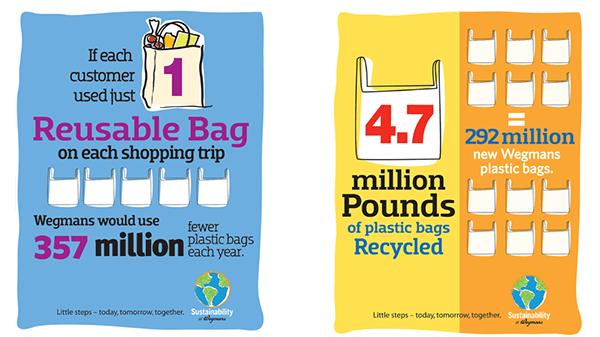Rochester, NY-based Wegmans Food Markets strengthened initiatives to reduce plastic in its stores and replace it with reusable bags, and materials made from plant-based renewable fiber.
The company said it plans to reduce in-store plastic packaging made from fossil fuels, along with other single-use plastic, like straws, by 2 million pounds in 2019, with a goal of a 10-million-pound reduction by 2024.
The company has been reducing plastic packaging since 2015, it said, and has already replaced produce bags with 100% plant-based renewable materials.
“We’re taking measurable steps to improve and implement programs that increase our recycling rate, minimize waste and help make a difference in every community we serve,” said Jason Wadsworth, Packaging and Sustainability Manager, in a news release. “One area we’re paying particular attention to is packaging. We need to ensure packaging is functional and performs as expected, which is key to reducing food waste.”
Wegmans’ announcement is one of many retailers promoting plastic-reduction initiatives, including Monrovia, CA-based Trader Joe’s, which has started phasing out plastic in produce packaging, and introduced compostable bags for bulk produce.
Bentonville, AR-based Walmart Inc., too, is promoting using fewer single-use plastic bags by offering reusable grocery bags for purchase at all checkouts. The reusable bags are made from post-consumer recycled content and follow an announcement of a series of plastic reduction goals, which include having 100% of Walmart’s private label packaging recyclable, reusable or industrially compostable by 2025.
In its New York State stores, Wegmans plans to eliminate plastic grocery bags ahead of a statewide ban slated to take effect March 1, 2020.
“By the end of this year, we will eliminate the use of plastic grocery bags in our New York State stores,” Wadsworth said, in a news release. “We want to get out ahead of this because we have a lot to learn from our customers about how we can help make the shift to reusable bags, which are far better than paper bags for the environment.”
Plastic reduction is a hot topic for the grocery and fresh produce industry. Canadian Produce Marketing Association President Ron Lemaire recently identified it as a key issue for the organization.
Recent studies, including a 2018 life-cycle assessment by Denmark’s Ministry of Environment and Food, found that single-use plastic bags had a lower overall environmental impact than their replacements, the worst of which was organic cotton reusable totes, which must be used 20,000 times to have an equal environmental impact as a single-use low-density polyethylene bag.
Recycled plastic bags must be reused at least two times, and a woven polypropylene bag must be used at least 45 times.
Recycled polyethylene terephthalate must be reused 84 times, according to the study, which considered cumulative environmental impact, including water use and energy use.



